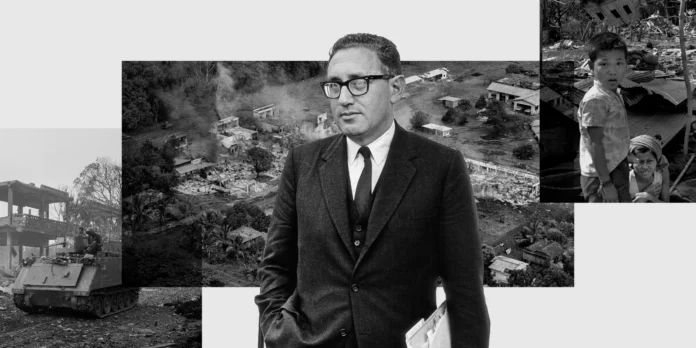Author: Michael Hirsh
Affiliation: Foreign Policy
Organization/Publisher: Foreign Policy
Date/Place: June 7, 2020/USA
Type of Literature: Essay
Word Count: 3952
Link: https://foreignpolicy.com/2020/06/07/kissinger-review-gewen-realism-liberal-internationalism/
Keywords: Henry Kissinger, Barry Gewen’s book The Inevitability of Tragedy, Realpolitik, The Coming Anarchy, China’s Rise, and the Future of US Foreign Policy
Brief:
Michael Hirsh argues that the current features of today’s world, the US’ dilemmas, and the US-led liberal international order require – more than ever – evoking Henry Kissinger’s way of thinking. Because Neo-conservatism (Neo-Wilsonianism) has died, and while liberal internationalism is discredited, “Isolationist Trumpism” will not be useful to save America from the coming challenges, especially those related to the coming international anarchy accompanied by the growing fierce geopolitical competition between the Great Powers and the rise of China in particular. Therefore, Washington today needs to return to realpolitik and adopt a smart and strict strategic diplomacy such as that which Hans Morgenthau theorized for and which Kissinger expanded through his pioneering career. The author views the current crises in the US and the anarchy world with which it is interacting as especially similar to the crises and the dangerous world that existed in the days of Kissinger in the 1970s; but Kissinger, who the author views as one of the greatest realists of the last century, excelled in overcoming them, namely: the Vietnam crisis, the oil crisis, the Cold War with the Soviets, as well as the US attempt to tame China and win it on its side or at least neutralize it by opening policy. This essay is based largely on a recent book by Barry Gewen entitled, “The Inevitability of Tragedy: Henry Kissinger and His World,” which especially concerns Kissinger’s vision on China and the rivalry between the great powers. Hirsh believes that the answer to the question of US-China future relations, global peace, and stability, exists in the past through a return to Kissinger and his philosophy. The Kissingerian policy has proven effective in transforming the rivalry between great powers into a stable and peaceful mode of coexistence. This Kissingerian policy has a set of features, the most important being Realpolitik, where every great statesman has known that the “choices he faced were not between good and evil … but between bad and less bad,” writes Gewen. What Kissinger calls “metaphysical humility,” a pragmatic sense and an intuitive ability to sense the future and thus control it, is relied upon instead of relying on “providence/the will of God” in foreign policy, as Reagan or Bush Jr. did, which caused the worst disasters in modern US foreign policy history. Smart, patient, and decisive diplomacy is also a key feature, as the author talks about the strategic and diplomatic intelligence that distinguished Kissinger, citing his greatest achievement in the early 1970s as concerning the openness to China and its engagement in the international order to contain and change it gradually—an approach that took a quarter of a century until it became familiar in Washington and adopted by liberal internationalists after the Cold War. As for the decisiveness feature that characterized Kissinger’s philosophy, the author provides examples of what he did (with Nixon) in the seventies, such as overseeing the brutal campaign to force Hanoi to the table, dropping more bombs on Cambodia than all the bombs the Allies dropped in World War II, etc., until Kissinger was described as a paranoiac and a war criminal. The essay also introduces Kissinger’s ability to see the future, such as: his prediction of the imminent sunset of the American-style liberal democratic capitalism since the Reagan era and the end of the Cold War (the time in which liberalism was living its victories); his urging to attach great importance to preserving the balance of power in many regions of the world and not to exaggerate the adoption of the moralistic Wilsonianism in American foreign policy; and his assertion (with Morgenthau) that the more populist a democracy becomes, the less able it is to conduct reliable foreign policy (which we see clearly with Trump today). Hirsh concludes this essay by mentioning some of Kissinger’s views on what is happening today, especially concerning the coming anarchy, the competition between the currents that want to guide American foreign policy (Neo-Wilsonianism, Liberal Internationalism, Isolationist Trumpism, etc.), and most importantly, Kissinger’s vision of the way the international order should be viewed. No international order can survive if it isn’t viewed as being just, that it must be “based on agreement rather than reluctant acquiescence.” He stresses that the biggest task that the US should undertake today is “to build a moral consensus which can make a pluralistic world creative rather than destructive.”
By: Djallel Khechib, CIGA Senior Research Associate




